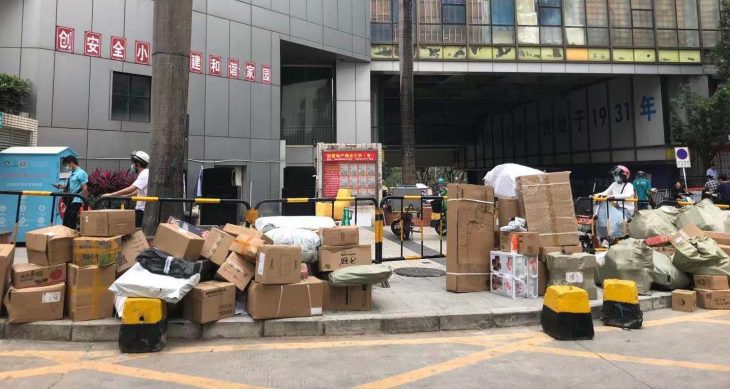China’s e-commerce behemoths Alibaba and JD.com again claimed to have set records during the world’s largest shopping event, Singles’ Day. The figures can often be gamed to paint a rosy picture of perpetual growth, journalists and analysts have long observed, so they are limited metrics for measuring the firms’ performance or Chinese consumers’ purchasing power in times of COVID-19.
Nonetheless, the heavy workload for express couriers is indisputably real and visible.
Starting the second week of November, I noticed parcels beginning to pile up outside my apartment compound in downtown Shenzhen, awaiting their final doorstep delivery. Courier workers dashed in and out of elevators, hurling boxes of items that shoppers bought at discounts or after being tricked by elaborate sales formula into thinking they got good deals.
Singles’ Day will see 2.97 billion packages delivered across China between November 11-16, the period when merchants begin shipping after a pre-sale period, according to a notice from the State Post Bureau. That marks a 28% increase from the year before and doubles the normal daily volume.
It also means that, on average, every person in China is set to get more than two parcels during the shopping spree. They will also receive plenty of e-commerce waste, from cardboard, to tape, to wrapping bubble. Both JD.com and Alibaba’s Cainiao logistics arm have rolled out programs aiming to make online shopping more sustainable.
While coronavirus infections continue to climb in many countries, China has had few local transmissions for months. As such, the pandemic has had a limited impact on delivery speed during Singles’ Day this year, both JD.com and Alibaba told TechCrunch.
Still, the companies have deployed new rules to ensure safety and speed. JD.com, for instance, claimed that it sanitizes its delivery stations and trucks and requires workers to wear masks and take their temperature on a daily basis, practices that are now standard in the country’s logistics sector. Pre-sale also allowed it to allocate inventory closer to consumers in advance. It said that 93% of the shipment orders fulfilled by its own logistics system were completed in less than 24 hours.
Alibaba, on the other hand, said it has added more contactless facilities such as unmanned warehouses and delivery vehicles. Its self-serve package pick-up machines now numbered nearly 20,000 units across 150 cities nationwide.
The story was updated on November 13, 2020 with information from Alibaba.
